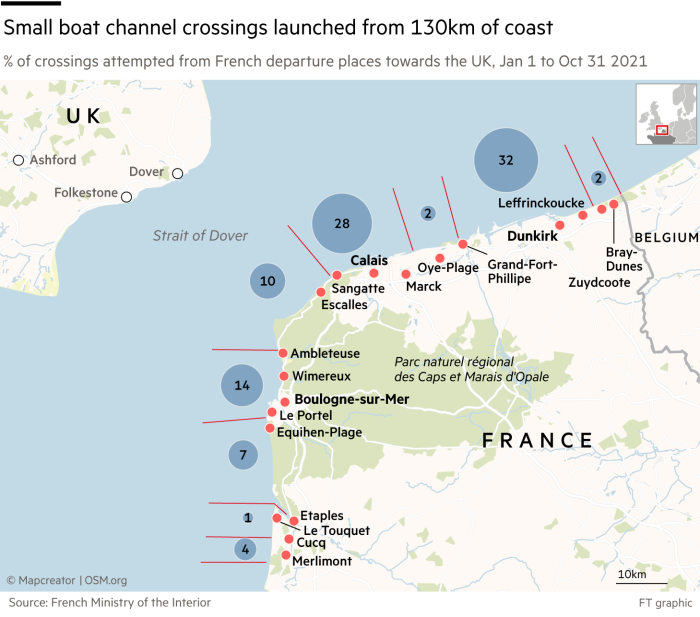This article is an on-site version of our Europe Express newsletter. Sign up here to get the newsletter sent straight to your inbox every weekday and Saturday morning
Welcome back. This week I’m looking at how European countries, including the UK, are addressing the issue of refugees and migrants arriving at their borders. As ever I’m at tony.barber@ft.com.
Something rather revealing happened on Tuesday. After UK prime minister Boris Johnson had a phone conversation with French president Emmanuel Macron, Downing Street published a press release. Among other things, it said:
The prime minister thanked president Macron for his efforts to help resolve border disruption and tackle the scourge of illegal people trafficking.
That’s interesting, I thought. I wonder what the Élysée Palace says? Here’s the answer — the two leaders talked about support for Ukraine, the food crisis arising from Russia’s invasion and bilateral UK-French relations. Not a word on “the scourge of illegal people trafficking”.
The differing accounts of Johnson’s chat with Macron speak volumes about a) modern techniques of news management and b) the preoccupation of the UK’s ruling Conservative party with migrants and refugees crossing the Channel from France to the southern English coast.
No doubt about it, the numbers are going up. According to UK government statistics, some 28,526 people arrived last year on small boats, up from 8,466 in 2020, 1,843 in 2019 and 299 in 2018. This year more than 17,000 have crossed, including more than 8,000 since the government’s policy to deport asylum-seekers to Rwanda was announced in April.
The flows are continuing despite the Home Office’s much-publicised plan to send asylum-seekers for resettlement in Rwanda, a small African country that is roughly 6,500km from London by plane. Because of legal challenges, this plan has yet to come into effect.
But a cross-party House of Commons committee of MPs concluded last month that there was “no clear evidence” that the Rwanda plan would deter Channel crossers. One priority should be closer collaboration with the French authorities, it said.
As indicated by the conflicting versions of Johnson’s conversation with Macron, plenty of work remains to be done on that front.

How do matters stand on the EU’s borders?
According to Frontex, the border and coast guard agency of the 27-nation bloc, there were about 155,000 irregular entries into the EU in the first half of this year. That’s about 86 per cent up on the same period of 2021.
Almost half the illegal crossings occurred on the so-called “western Balkan route”, where the main nationalities making the trip were people from Syria, Afghanistan and Turkey.
These numbers, though rising, are far below the levels of 2015, when the EU recorded some 1.8mn illegal crossings and thousands of people drowned in the Mediterranean.
And behind these figures lies a story — perhaps the most overlooked European story of the year.
After a year-long investigation, the EU’s anti-fraud office, known as Olaf, compiled a devastating report on the activities of Frontex. It asserted that the border control agency covered up and even encouraged illegal pushbacks of asylum-seekers trying to enter Greece.
We know this because of some dogged reporting by the German magazine Der Spiegel, the French newspaper Le Monde and the investigative news site Lighthouse Reports. Frontex, and the EU as a whole, have said as little as possible about the scandal.
But the Olaf report was shocking enough to force the resignation of Fabrice Leggeri, a Frenchman who had run Frontex since 2015.
Meanwhile, in a little-noticed case, the European Court of Human Rights ruled on July 7 that Greece had acted illegally in pushing back a fishing boat with 27 people aboard towards Turkish waters. This incident, which occurred in 2014, resulted in 11 deaths.
Are illegal pushbacks going to stop? One thing’s for sure: the EU isn’t giving up on expulsions — or “returns”, to use the EU’s euphemism.
In late July, Frontex published its latest Strategic Risk Analysis, which presents the outlook up to 2032:
In the next decade, EU border management will experience a high occurrence of migration/refugee crises (or disproportionate pressures) that will test the effectiveness of border controls . ..
In this context, returns will be a key capability . . . as migration management depends heavily — beside establishing legal pathways and integration — on effective returns carried out in a fast, orderly, humane and dignified manner.
To their credit, most EU countries have done a great job in welcoming refugees from Russia’s invasion of Ukraine. More than 6.3mn Ukrainians have sought shelter across Europe, though many have returned.
But in recent years the treatment of non-European refugees and migrants tells a different story. Border controls are essential. Using illegal methods to keep out unwanted people is unworthy of the EU, which prides itself on its attachment to the rule of law.
-
How migration became a weapon in a “hybrid war” — a FT Big Read on EU immigration policies
-
Between politics and inconvenient evidence — a report by the Centre for European Policy Studies think-tank on the EU’s action plan against migrant smuggling
-
The paradox of Polish migration policy — a commentary for Social Europe by Maria Skóra, research associate at the Institut für Europäische Politik in Berlin
Notable, quotable
Like trying to sell snow in the North Pole — US-based commentator Alicia Smith sums up why Domino’s Pizza is ending its bid to get a slice of the Italian pizza market
Tony’s picks of the week
-
Developing countries must be careful about taking on more loans from China’s Belt and Road Initiative, AHM Mustafa Kamal, Bangladesh’s finance minister, says in an interview with the FT’s Benjamin Parkin in Dhaka
-
The Kremlin appears to be pushing ahead with plans to annex occupied areas of Ukraine by means of referendums, despite classified opinion polls indicating tepid local support for absorption into Russia, reports Andrey Pertsev for the Meduza news site
Recommended newsletters for you
Are you enjoying Europe Express? Sign up here to have it delivered straight to your inbox every workday at 7am CET and on Saturdays at noon CET. Do tell us what you think, we love to hear from you: europe.express@ft.com. Keep up with the latest European stories @FT Europe





















Discussion about this post